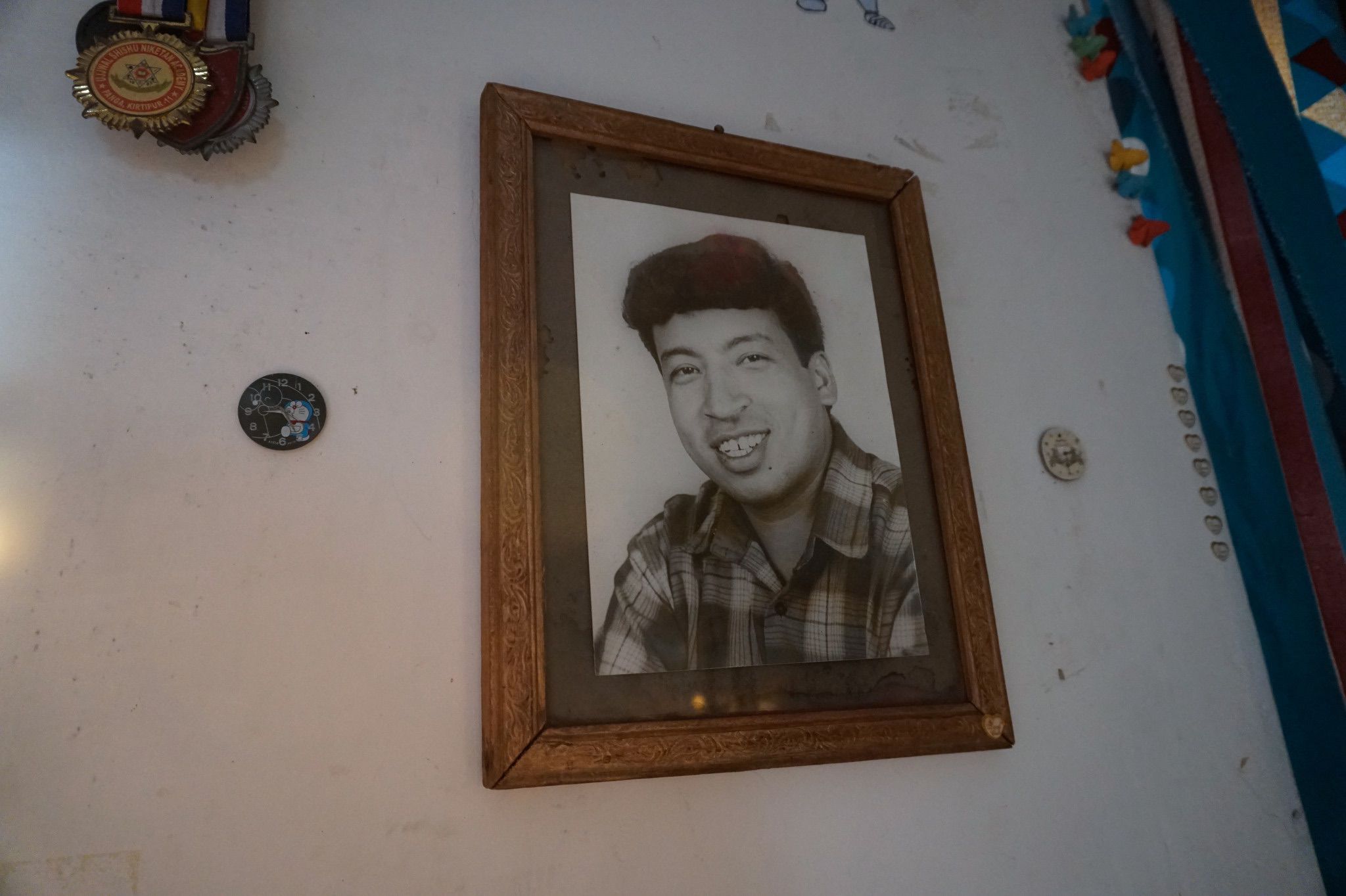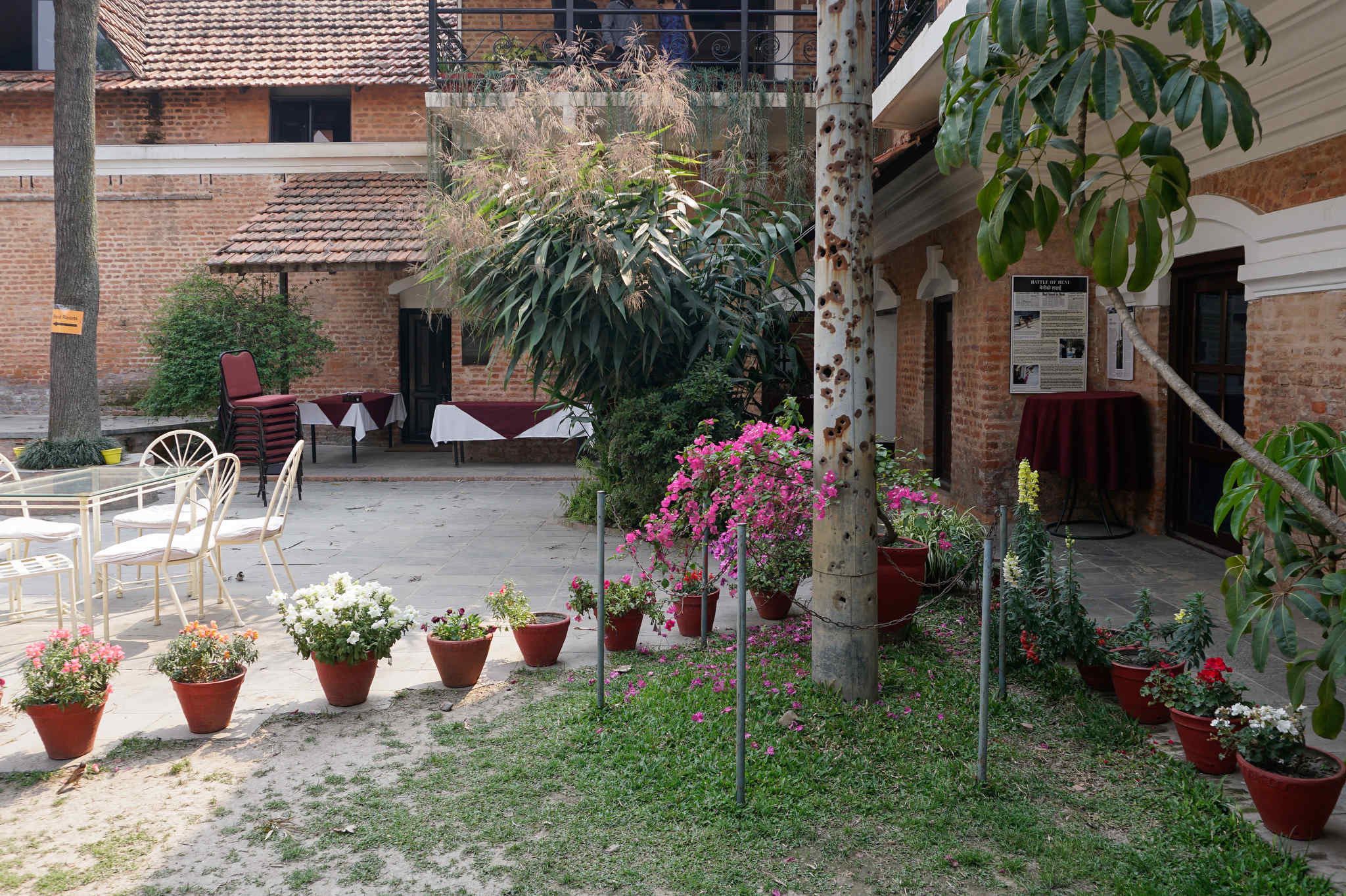
Shilu Manandhar, GPJ Nepal
Srijana Shrestha sits for a portrait in her home in Kirtipur. Shrestha says her husband was shot dead in their home in 2002 by members of the People’s Liberation Army, the armed wing of the Communist Party of Nepal (Maoist).
KIRTIPUR, NEPAL — On an October evening more than 20 years ago during Nepal’s civil war, three men casually walked into Srijana Shrestha’s house in her husband’s hometown of Kirtipur. Her husband, a young, popular and influential local leader in the Nepali Congress political party, went to greet them at the door. Shrestha was in the next room when she heard the gunshots.
Her 4-year-old son saw everything — his father falling down and lying still on the floor in a pool of blood. One of the men had shot her husband. The killing happened in 2002. Now 25, her son is still haunted by the murder.
“He doesn’t trust anyone,” Shrestha says. “He does not meet or interact with any guests that come home, even relatives.”
The men who killed her husband, she says, were members of the People’s Liberation Army, the armed wing of the Communist Party of Nepal (Maoist), who’d picked up arms against the government.
She will never forget the day her husband was murdered, she says.






Shrestha wants justice. She wants her husband’s murderers prosecuted. She wants a guarantee that her people and her country will never face another armed conflict. She wants the long-awaited transitional justice bill to pass.
But not as it is. She wants the bill amended.
Nepal is on the verge of passing a controversial bill intended to help the country recover from its civil war despite outcries from advocates and people on all sides, including Shrestha, that it lets perpetrators of violence off the hook.
The transitional justice bill, which would amend the Investigation of Enforced Disappeared Persons, Truth and Reconciliation Commission Act of 2014, was registered by the Ministry of Law, Justice and Parliamentary Affairs in Parliament for the third time in March, despite not including amendments ordered by the Supreme Court of Nepal in 2015. More than 186 proposed amendments have been registered by over 30 parliamentarians based on discussions with those who lived through the conflict and other stakeholders. If passed without amendments, the bill as written would provide immunity to perpetrators and people will not get justice, critics of the bill say.
During Nepal’s civil war, which took place from 1996 to 2006, the Communist Party of Nepal (Maoist) fought against the other parties in power during that period, including the Nepali Congress. More than 17,000 people were killed and more than 2,500 disappeared in the armed conflict. Both sides committed human rights abuses and violated international humanitarian law. In 2006, the opposing sides signed the Comprehensive Peace Accord and ended the decade-long war. They committed to establishing truth — an authoritative record of what happened during the war — and providing justice for human rights violations and crimes. After several attempts, an act designed to grant amnesty to perpetrators was adopted into law in 2014.



But in 2015, the Supreme Court ruled that the truth and reconciliation act was flawed. The court ordered the government to amend the law by consulting with groups of people who had experienced violence and crimes, as well as other stakeholders, such as human rights organizations. But those groups say they were excluded from the bill-drafting process and that it was not shared with them before it was registered in Parliament earlier this year.
“If you allow impunity to prevail, then there could be another conflict again,” Shrestha says.
Seventeen years have passed since the peace agreement. Since then, around 600 cases of human rights violations and crimes have been investigated, only 29 of which have been sent to the cabinet and finalized.
Prime Minister Pushpa Kamal Dahal’s government is spearheading the transitional justice bill. Dahal was the Maoist commander in chief during the armed conflict.
The bill is currently being discussed in the Parliament’s Law, Justice and Human Rights Committee.
“Some amendments will be accepted and some won’t,” says Eak Ram Giri, joint secretary and spokesperson for Nepal’s Federal Parliament Secretariat. Parliament follows procedures and is neutral, Giri says. “That is why stakeholders are called for discussions regarding amendments of the bill,” he adds.
The Communist Party of Nepal (Maoist) launches a “People’s War” against the Nepali government.
A peace agreement is reached and the war ends with around 13,000 people killed and more than 1,300 missing, according to initial figures. The estimates would rise to more than 17,000 dead and 2,500 missing.
An attempt to establish two transitional justice commissions is highly criticized and fails.
The Investigation of Enforced Disappeared Persons, Truth and Reconciliation Commission Act is signed into law.
Two agencies are created: the Truth and Reconciliation Commission and the Commission on the Investigation of Enforced Disappeared Persons.
But the Supreme Court nullifies some provisions of the act as unconstitutional and in violation of international human rights law.
The commissions’ initial two-year mandate to investigate cases expires and is renewed for a year. The mandate is extended again in 2018 for another year after failing to investigate and recommend any of the more than 63,000 cases of human rights violations registered.
The two transitional justice bodies get new officials and the mandate is extended for a third time. The mandate is extended twice more without meaningful progress.
A bill is proposed to amend the act, but human rights advocates say it doesn’t go far enough.
The bill is reintroduced for the third time without making the amendments required to meet legal obligations ordered by the Supreme Court.
The more time passes, the harder it will be to find evidence and witnesses, says Nirajan Thapaliya, director of Amnesty International in Nepal, a human rights organization.
“Until now, the political parties precisely wanted to ‘delay, dilute and deny’ the justice process,” says Thapaliya.
Advocates like Thapaliya say that the bill does not adhere to international human rights laws and in its current form provides amnesty for grave human rights violations.
The current bill provides amnesties for murder and sexual violence (except rape), beating and mutilation, abduction, arson, forced displacement and illegal detention, Thapaliya says. International human rights laws dictate which crimes can be amnestied and which cannot. It does not permit amnesty for grave human rights violations, including arbitrary killing, torture, enforced disappearance or sexual violence, he says.
“The parties and leaders are making the transitional justice bill as a bargaining chip for their power deals,” Thapaliya says.



Political parties did not bring the law that should have been in line with the process and principles of transitional justice, Thapaliya says. Big parties like the Nepali Congress, the Communist Party of Nepal (Unified Marxist-Leninist) and the Communist Party of Nepal (Maoist) came into power, but due to partisan interests and power sharing were not interested in concluding the transitional justice process and completing the peace process.
“It was their responsibility after signing the peace agreement, but nothing has been done,” Shrestha says.
Groups from both sides of the conflict say they are unhappy with the bill, says Tikaram Pokharel, a spokesperson for the National Human Rights Commission. They are divided because their ideologies and their perspectives of the conflict are different, Pokharel says. Some are focused on finding out the truth, or taking the perpetrators to court to get justice; others want to reach an agreement with the perpetrators and bring the transitional justice process to an end.
Many are tired and frustrated because of the delay in providing transitional justice, says Thapaliya. “Some have given up hope and others face challenges on how to keep the struggle for justice alive.”



Jatil Karki, who says his father was a Maoist and was killed by police, wants recognition for his father’s sacrifices. He wants him to be recognized as a martyr.
“We don’t want pity,” Karki says. “We want self-respect.”
But he also wants the transitional justice process to finish, he says. Everyone is seeking justice, regardless of what side they are on. Everyone suffered, no matter their ideology.
“We should put our ideologies behind us,” Karki says. “We should instead work toward reconciliation.”






